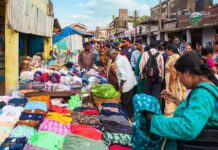Odisha Plus Bureau
Keeping in mind the lessons learnt during the COVID 19 pandemic, health services should be made available to the people in remote corners of Odisha through public-private-partnership mode, said Health and Family Welfare Minister Naba Kishore Das here on Thursday.
Speaking as chief guest of the inaugural session of ‘Sushruta: The Health Conclave’, organised by leading digital news platforms Odisha Bytes and Odisha Sambad, in Bhubaneswar, the minister said Odisha has emerged as an example around the world in the health sector because of steps taken to minimise human casualty during the pandemic.
“The prompt and extensive steps taken by Chief Minister Naveen Patnaik even before the coronavirus had assumed pandemic form in the state succeeded in bringing down its impact on the population,” he said. He thanked the doctors, nurses and health workers in both public and private hospitals who fought courageously and tirelessly across the state during the pandemic.
Chairman of Ashwini Group of Hospitals and eminent orthopaedic and plastic surgeon Dr Subrat Jena, in his speech as guest of honour, said Sushruta, who is considered the father of medical science in India is followed in many aspects from ancient times till now. His methods of plastic surgery remain unchanged even today, he added.
He said it is a matter of regret that Odisha failed to set up any medical college for 50 years from 1962 to 2012. After the MKCG Hospital started in Berhampur in 1962, there was no initiative to start any medical college in the state till 2012 when the AIIMS started operations.
However, he expressed satisfaction that several medical colleges in the public and private sectors have opened in the last few years. “This can gain momentum through public-private partnership in the health services,” he added.
The other guest of honour of the session, Chief Executive Officer of Bhubaneswar-based SUM Ultimate Medicare Dr Swetapadma Dash, said the psychological impact of any pandemic is profound. “A constant fear follows us wherever we go. Mask and hand rubs are a constant companion wherever we go. We have actually lost our independence and are prisoners now. And we are constantly looking forward to a bright, shining day when we can lead our lives on our own terms,” she said.
With an uncertain future staring at us amid the COVID pandemic, Dash said that there is a lot of fear, apprehension and desperation. “This brings us to the all-important question, what is health. WHO has beautifully defined health as a state of complete physical, mental and social well-being and not merely the absence of disease or infirmity,” she said.
She further said that this conclave has been designed to capture a lot of ideas, but there is a need to understand if the concept, of ‘health for all, is being addressed.
Dash said it is important to start from oneself and look at the sphere that one can influence. “COVID had cast its shadow on the opening of SUMUM, but we stood firm and played our parts. There are more than 50% BSKY patients in our hospitals and this is how we are contributing to the concept,” she added.
Well-known internal medicine specialist, Dr Niroj Kumar Mishra, technical spokesperson of Health and Family Welfare Department and Head of Department of Medicine, SCB Medical College and Hospital at Cuttack Dr Jayanta Kumar Panda and Head of Department of Clinical Immunology and Rheumatology, SUM Hospital, Dr Pradeepta Patro participated in the first-panel discussion on the topic “Epidemics are here to stay: The way ahead”.
They were of the opinion that the people of Odisha should not be under the impression that relaxation of restrictions by the government means the COVID pandemic has come to an end. Far from it, the fourth wave has started in Odisha as predicted by medical scientists, they said.
Different variants of the virus will continue to affect people, particularly those with a history of diseases like diabetes, high blood pressure and others. In some cases the disease may aggravate in people with co-morbid conditions, they cautioned.
On the question of the moderator, senior journalist Sandeep Sahu, whether public participation in the Rath Yatra in Puri is advisable now, they said the people cannot be kept in isolation or under restrictions for a long period as it would have a socio-psychological effect. But, they should follow minimum safeguards like wearing faces masks, washing hands and sanitisation to prevent the spread of coronavirus, they advised.
Eminent oncologist Dr Krupasindhu Panda, head of a department, surgical oncology, AIIMS-Bhubaneswar, Dr Madhabananda Kar and head of the Department of Medical Oncology, SUM Hospital, Dr Soumya Surath Panda participated in the second-panel discussion on the topic “Cancer is beatable: The Dostarlimab hope”.
They said Dostarlimab definitely holds a huge hope for cancer patients. But it has certain side effects and further research in this regard would only prove its effectiveness, they said. The discussion was moderated by anchor-journalist Balabhadra Rath.
In the valedictory session of the conclave, Minister of Rural Development, Skill Development and Technical Education Pritiranjan Ghadai elaborated on the steps taken by the state government to counter the COVID pandemic in the three waves so far. “The human casualty in Odisha was far less than other states and the national average in the first two phases due to the foresight of the government in making all necessary provisions on a war-footing before the outbreak. It reflects the government’s commitment to saving human lives,” he said.
Assuring the people of similar steps in future waves also, he advised people to practice self-restraint to keep away from being affected by the disease.
Vice-president and unit head of AMRI Hospitals, Bhubaneswar, Nilanjana Mukherjee spoke about the trying COVID times and the prevailing fear among families. “During that phase, the Odisha government and the Bhubaneswar Municipal Corporation gave the dead a dignified farewell. This is how the government supported us silently and we never realised it,” she said, elaborating on the government’s response to the pandemic and the public-private partnership that helped to tide over the difficult period.
Speaking about accountability, she said that a BSKY patient can tweet about ‘lack of treatment’ on social media and it would directly go to the chief minister. “Accountability will bring in quality. We have been talking about affordable healthcare, but it has to go hand-in-hand with quality. While the government is spending a lot on improving healthcare facilities in the state, there is also the need for government hospital accreditation and quality certification as is being done in Kerala and Gujarat. This will bring in better accountability in the spending, processes, documentation and services,” she said, suggesting the need for more quality healthcare in the government set-up.
She also requested the government to make it easier for investors to invest in the health sector.
Group Editor of Odisha Bytes and Odisha Sambad Sandeep Mishra delivered the welcome address and felicitated the guests, while editor of Odisha Bytes Punyaprava Rath proposed the vote of thanks.
Tags: #BSKY #Sushruta #HealthConclave #WHO #RuralDevelopment #SkillDevelopment #HealthandFamilyWelfare



























